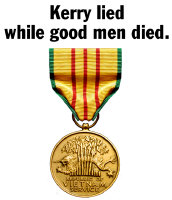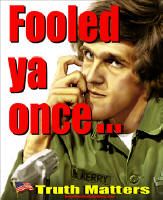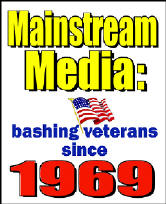Bush: NO DRAFT
One of the latest scare
tactics being used by Democrats is to imply that President Bush is
going to reinstitute the draft. This is totally false. The Bush-Cheney
website has the following information available regarding this latest
Dem lie: [LINK]
“No, we're not going -- we don't need the draft. Look, the
all-volunteer Army is working. The all-volunteer Army... I know
Senator McCain and I agree on this issue for certain, the
all-volunteer Army works." ~
President George W. Bush, August 10, 2004
President Bush is committed to keeping participation in the United
States Armed Services voluntary. The President’s cabinet has stated
that a draft is not being considered. Recruitment and retention rates
remain strong, and the military has not had any problem maintaining a
strong force. President Bush is confident in the current state of the
military and has assured that Nation that the all-volunteer military
force is working well.
President Bush's Administration has Remained Consistent on
the Draft
Vice President Cheney says all volunteer force "works
extraordinarily well."
"I don't foresee a situation in which we'd want to go back to the
draft. We made a decision after Vietnam to go with an all-volunteer
force... The all-volunteer force has produced an absolutely remarkable
group of men and women in the service. And I think it works. It
works extraordinarily well. And I'm a great believer in it... I
suppose, at some point down the road we'd have such a national crisis
or emergency, but it would have to be on the scale of World War II
before I would think that anybody would seriously contemplate the
possibility of going back again to the draft. I think what we have
works very well." (Vice President
Cheney, Oregon City, OR, September, 17, 2004)
Secretary Rumsfeld calls suggestion of Bush initiated draft
"nonsense."
When asked if by the Armed Services Committee about initiating the
draft, Secretary Rumsfeld replied, "That is absolute nonsense... It's
absolutely false that anyone in this administration is considering
reinstituting the draft." (Donald
Rumsfeld, Senate Armed Services Committee, September 23, 2004)
John Kerry is using the draft to scare young voters and veterans. During
campaign stops, John Kerry has worked to scare voters by suggesting
that President Bush will initiate a draft. "If George Bush were to be
re-elected, given the way he has gone about this war and given his
avoidance of responsibility in North Korea and Iran and other places,
is [a draft] possible? I can't tell you."
(John
Kerry, September 22, 2004)
It’s the FlipperCam!
The Republican National Committee has a FlipperCam you can watch to
keep track of John Kerry’s endless flip-flops. Here’s the link:
http://www.flippercam.com/
Also included on the website link are the 10 different positions Kerry
has proclaimed regarding Iraq:
1. October 2002: Kerry Voted For Use Of Force Resolution Against
Iraq. Kerry and Edwards voted for the Congressional resolution
authorizing the use of force against Iraq.
(H. J. Res. 114, CQ Vote #237: Passed
77-23: R 48-1; D 29-21; I 0-1, 10/11/02, Kerry Voted Yea)
2. April 2003: Kerry Promised Not To Attack President When War
Began, But Weeks Later, With Troops Just Miles From Baghdad, Kerry
Broke His Pledge And Called For "Regime Change In The United States."
(Glen Johnson, "Democrats On The
Stump Plot Their War Rhetoric," The Boston Globe, 3/11/03; Glen
Johnson, "Kerry Says Us Needs Its Own 'Regime Change,'" The Boston
Globe, 4/3/03)
3. May 2003: In First Dem Debate, Kerry Strongly Supported
President's Action In Iraq. SEN. JOHN KERRY: "I said at the time I
would have preferred if we had given diplomacy a greater opportunity,
but I think it was the right decision to disarm Saddam Hussein, and
when the President made the decision, I supported him, and I support
the fact that we did disarm him." (ABC
News, Democrat Presidential Candidate Debate, Columbia, SC, 5/3/03)
4. September 2003: Kerry Said Voting Against The $87 Billion
Supplemental Would Be "Irresponsible." Doyle McManus (LA Times):
"If that amendment does not pass, will you then vote against the $87
billion?" Kerry: "I don't think any United States senator is going to
abandon our troops and recklessly leave Iraq to - to whatever follows
as a result of simply cutting and running. That's irresponsible."
(CBS's "Face the Nation," 9/14/03)
5. October 2003: Kerry Voted Against The $87 Billion Supplemental
Supporting Our Troops. (S. 1689, CQ
Vote #400: Passed 87-12: R 50-0; D 37-11; I 0-1, 10/17/03, Kerry Voted
Nay)
6. January 2004: After Voting For War And Trailing Candidate Howard
Dean In The Democrat Primaries, Kerry Says He Is Anti-War Candidate.
CHRIS MATTHEWS: "Do you think you belong to that category of
candidates who more or less are unhappy with this war, the way it's
been fought, along with General Clark, along with Howard Dean and not
necessarily in companionship politically on the issue of the war with
people like Lieberman, Edwards and Gephardt? Are you one of the
anti-war candidates?" KERRY: "I am -- Yes, in the sense that I don't
believe the president took us to war as he should have, yes,
absolutely." (MSNBC's "Hardball,"
1/6/04)
7. August 2004: In Response To President's Question About How He
Would Have Voted If He Knew Then What He Knows Now, Kerry Confirmed
That He Would Still Have Voted For Use Of Force Resolution. SEN.
JOHN KERRY: "Yes, I would have voted for the authority. I believe it's
the right authority for a president to have. But I would have used
that authority as I have said throughout this campaign, effectively. I
would have done this very differently from the way President Bush
has." (CNN's "Inside Politics," 8/9/04)
8. September 2004: Kerry: Iraq Is "The Wrong War In The Wrong Place
At The Wrong Time." "Democratic presidential nominee John Kerry on
Monday called the invasion of Iraq 'the wrong war in the wrong place
at the wrong time' and said his goal was to withdraw U.S. troops in
his first White House term." (Patricia
Wilson, " Kerry on Iraq: Wrong War, Wrong Place, Wrong Time", Reuters,
9/6/04)
9. September 2004: Kerry Says There Were No Circumstances Under
Which We Should Have Gone To War, But He Was Still Right To Vote For
It. IMUS: "Do you think there are any circumstances we should have
gone to war in Iraq, any?" KERRY: "Not under the current
circumstances, no. There are none that I see. I voted based on weapons
of mass destruction. The President distorted that, and I've said that.
I mean, look, I can't be clearer. But I think it was the right vote
based on what Saddam Hussein had done, and I think it was the right
thing to do to hold him accountable. I've said a hundred times, there
was a right way to do it and a wrong way to do it. The president chose
the wrong way. Can't be more direct than that."
(MSNBC's "Imus In The Morning," 9/15/04)
10. Kerry Said That The Removal Of Saddam Hussein Has Left America
"Less Secure." KERRY: "Saddam Hussein was a brutal dictator who
deserves his own special place in hell. But that was not, that was not
in and of itself, a reason to go to war. The satisfaction - The
satisfaction that we take in his downfall does not hide this fact: we
have traded a dictator for a chaos that has left America less secure."
(Sen. John Kerry, Remarks At New York
University, New York, NY, 9/20/04)
Has Bush set a Debate Trap for Kerry?
Former Bill Clinton political strategist Dick Morris says President
Bush has set a debate trap for John Kerry – one that will force him to
take positions opposed by a large percentage of his backers.
NewsMax.com is carrying the article [LINK].
"What's happened is that Bush has set up a trap for Kerry," Morris
told Fox News Channel's "Hannity & Colmes." "He has so emphasized
Kerry's flip-flopping, so-called weakness, vacillation, all that
stuff, that Kerry has to take strong positions in the debate."
That will force Kerry to make his position clear once and for all on
Iraq, the top strategist said - which will inevitably cost him votes.
Morris explained:
"A third of his voters are certified hawks, who say that we're winning
the war on terror. . . . [But] half of his voters are doves. When he
starts adopting an anti-Iraq line, anti-war line, he's going to
alienate a third of his own voters."
If Kerry comes out strong for the war, however, he can say goodbye to
the anti-war types who think he'll cut and run.
"Kerry has a strategic problem," said Morris. "And it doesn't matter
how good a debater you are and how attractive you are. Every time he
opens his mouth on a foreign policy debate, he's got to take a
position that alienates a portion of his voters."
Rudy Giuliani’s ‘Kerry Debate Briefing Book’
Former New York City Mayor Rudy Giuliani visited
Spring Green, Wisconsin – where John Kerry is prepping for the
upcoming foreign policy debate on Thursday – and unveiled the “Debate
Briefing Book for Senator Kerry” (as prepared by Bush-Cheney '04) and
issued the following statement:
"Senator Kerry has taken so many different positions on the issues
facing the country that we thought he would benefit from the overview
of the most interesting debate -- the one John Kerry is having with
himself. He's been for the war, against the war and for it and
against it again. Last week, he became an anti-war candidate again.
This is a fatal flaw and the American people see through it. John
Kerry is not able to take a principled position and is the wrong
choice to guide America through this critical time."
Get your copy of Senator Kerry's Debate Briefing Book by clicking
here.
Giuliani is stumping for President Bush in Wisconsin, and makes his
position plain in an article carried by Wisconsin newspaper The
Capital Times [LINK]:
The country's credibility is at stake, Giuliani said. If the United
States pulls out of Iraq, no nation will fear it in the future, he
said.
"The situation in Iraq is very difficult. It's going to be a long,
long struggle," Giuliani said, but added, "President Bush will stick
with it."
Taking aim at Kerry’s slamming of Iraqi Prime Minister Ayad Allawi’s
visit to the U.S. and thank you speech, Giuliani said: "You're not
going to get allies by attacking Allawi." Giuliani says that Kerry is
"a great debater," but added: "President Bush is very plain-speaking,
very straight. He doesn't change based on public opinion changing."
Latest Poll Numbers from Rassmussen
Arkansas: Bush 51-44% (one point Bush gain this week)
California: Kerry 53-39% (three point gain for Bush from last
week)
Missouri: Bush 50-46% (two point Kerry gain from last poll of
9/7)
New Jersey: Kerry 49-46% (two point Bush gain from last week)
New York: Kerry 53-41% (six point gain from last week's
polling)
NewsMax.com reports that American troops serving in Iraq are fearful
of a John Kerry presidency: [LINK]
U.S. troops on the ground in Iraq are "terrified" at the prospect that
Americans back home might elect John Kerry president, a Marine Iraq
veteran who is on his way back to the frontlines said Monday.
Asked how Kerry's election would effect troop morale in the combat
zone, Lance Corporal Lawrence Romack told KWEL Midland, Texas radio
host Craig Anderson, "It would destroy it." "We're pretty terrified of
a John Kerry presidency," added Romack, who served with the 1st Marine
Tank Battalion in Iraq.
The Iraq war vet said he fears that most of the news coverage is being
skewed to make the mission look like a failure in order to give the
Kerry campaign a boost.
"What they're trying to do is get Kerry into the White House, because
they know he doesn't want us to stay [in Iraq]," he told Anderson.
Asked if Americans back home were getting an accurate picture of
what's happening in the war, the Marine corporal said, "No, they're
not. It's not even close. All the press wants to report is casualty
counts. They don't want to report the progress we're making over
there."
Romack noted that in southern part of the country, Iraqis welcomed
U.S. troops when they set up an immunization programs for children,
opened schools and began distributing food.
"Almost immediately people were lining up to get their kids shots," he
told Anderson.
Contrary to reports that the general population was too afraid to help
ferret out insurgents, Romack said, "We had Iraqis pointing out former
Baath Party members for us to arrest."
When the KWEL host opened up the phone lines, a member of the 82nd
Airborne who had returned from Iraq in March was first on the line.
He agreed with Cpl. Romack that media reports coming out of Iraq were
often inaccurate - and sometimes even dangerous.
"The news media - sometimes I felt like I had as much to fear from
them as I did the Iraqis," he complained.
John Kerry has made big time arguments for expanding the
"international support" in the War On Terror and particularly in Iraq.
But according to reports, the French and the Germans are having none
of it. FT.com (Financial Times) has a good read article detailing this
troublesome aspect of Kerry’s foreign policy fantasy: [LINK]
Even though Nato last week overcame members' long-running reservations
about a training mission to Iraq and agreed to set up an academy there
for 300 soldiers, neither Paris nor Berlin will participate. Michel
Barnier, French foreign minister, said last week that France, which
has tense relations with Iyad Allawi, the country's interim prime
minister, had no plans to send troops “either now or later”.
That view reflects the concerns of many EU and Nato officials, who say
the dangers in Iraq and the difficulty of extricating troops already
there could make European governments reluctant to send personnel,
regardless of the outcome of the US election.
A French government official said: “People don't expect that much
would change under a Kerry administration, even if things can only
getbetter. We do not anticipate a sudden honeymoon in the event that
Kerry replaces Bush. A lot depends on who is in power in both
Washington and Baghdad.
“If there's change in both countries then it's possible we would
re-examine our position, but I don't expect a massive change either
way.”
A German government spokesman declined to comment on the outcome of
the US presidential election. But the feeling in Chancellor Gerhard
Schröder's office is that, if anything, Berlin is growing less rather
than more likely to change its mind as security conditions deteriorate
in Iraq.
Mr Schröder would also be unlikely to renege on his 2002 electoral
commitment not to send troops as a new general election looms in 2006.
There is no sign that the German public, which loathes the US
president, would accept risking German lives to salvage what is widely
seen as Mr Bush's botched war.
In fact, high-ranking German officials are privately concerned at the
prospect of Mr. Kerry becoming president, arguing it would not change
US demands but make it more difficult to reject them.
So, what’s the plan, Kerry? Your pseudo-allies aren’t backing you up.










